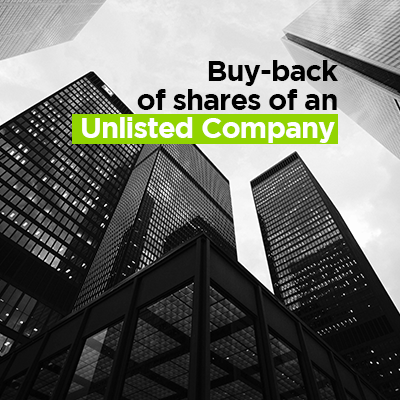Buy-Back of Shares of an Unlisted Company
Author: – Ms. Vanaja Kaleru
Email: – vanaja@simplybiz.in
- A Buy-back is a corporate action in which a company buys back its shares from the existing shareholders, whereby the number of shares outstanding in the share capital reduction. It is the option available to shareholders to exit from the company of their volition.
- 1. Objective of Buy-back
- To reduce the number of shareholders/shares of the Company, thus enhancing the EPS (Earning Price Share) to the shareholders in the long run.
- To increase the holding of the promoters
- To distribute the surplus cash among the shareholders
- To improve company P/E Ratio and return on net worth, return on assets
- To write off capital which is not supported by assets
- For investing companies, accumulated funds to return the capital
- To provide an exit option to the Investors
- 2. Modes of Buy-back
The following are the modes of buy-back of its shares or other specified securities:
- From the existing shareholders or other specified holders on a proportionate basis;
- From the open market;
- By purchasing the securities issued to employees of the company under a scheme of stock option or sweat equity.
- 3. Sources of Buy-back
- A company can purchase its shares and other specified securities out of –
- Its free reserves; or
- the securities premium account; or
- The proceeds of the issue of any shares or other specified securities
- Note
No buy-back of any kind of shares or other specified securities shall be made out of the proceeds of the earlier issue of the same kind of shares or same kind of other specified securities.

- 4. Conditions of Buy-back
- Articles of the company must authorize the buy-back of shares
- The board's approval is required if the buyback is done up to 10% of paid-up capital and free reserves otherwise members approval by way of special resolution
- A company cannot buy back more than 25% of its paid-up capital and free reserves and the buy-back of equity shares in any financial year shall not exceed 25% of its total paid-up equity capital in that financial year
- Post buyback debt-equity ratio cannot exceed 2:1
- Only fully paid-up shares can be bought back
- No offer of buy-back shall be made within one year from the date of closure of the preceding offer of buy-back if any
- The company has to extinguish and physically destroy the shares so bought back within seven days of the last date of completion of buy-back and shall also maintain a register of shares bought back mentioning the particulars as specified after completion of buy-back
- Statutory Auditor has to certify in their report addressed to Board that the audited accounts based on which calculation regarding buy-back is done are not more than six months old from the date of the offer document. However, where the audited accounts are more than six months old, the calculations regarding buy-back shall be based on un-audited accounts not older than six months from the date of the offer document which are subjected to limited review by the auditors of the company
- The Board of Directors has to confirm that the company will not render insolvent within one year from the date of buy-back.
- 5. Restrictions on buy-back of securities
- (i) A Company shall not buyback its securities or other specified securities in case there is a default:
- in repayment of any term loan or interest payable thereon to any financial institution or banking company
- in payment of dividend
- concerning the filing of annual returns with the Registrar of Companies.
- concerning the filing of financial statements with the Registrar of Companies
- (ii) A company shall not make a further issue of the same kind of shares or other securities including allotment of new shares under section 62(1)(a) or other specified securities within six months of Buy-back of its shares except by way of a bonus issue or in the discharge of subsisting obligations such as the conversion of warrants, stock option schemes, sweat equity or conversion of preference shares or debentures into equity shares.
- 6. Tax Implications
The Companies are liable to pay income tax on an amount of distributed income on the buy-back of shares from shareholders. The Company is required to pay the capital gains tax as well and the shareholder is not liable for the same.
- 7. FEMA Compliances
As per FEMA Buy-back of shares is treated as a transfer of shares from a non-resident to a resident [i.e., from a Foreign shareholder to the Company]. Form FC-TRS has to be filed within 60 days of payment of consideration.
- Conclusion
The buyback of shares is generally considered a good opportunity by the shareholders as it provides an easy exit route at a premium price and the shareholders will have an opportunity to invest in other best available options.
We, at SimplyBiz, offer comprehensive advisory and compliance support under the Companies Act, FEMA, and Tax etc., We have a deep understanding of the provisions, and extensive experience in documentation and coordination with the regulator to ensure that the entire process completes smoothly within the stipulated timelines.
We, at SimplyBiz, offer comprehensive advisory and compliance support under the Companies Act, FEMA, and Tax etc., We have a deep understanding of the provisions, and extensive experience in documentation and coordination with the regulator to ensure that the entire process completes smoothly within the stipulated timelines.

Leave A Comment